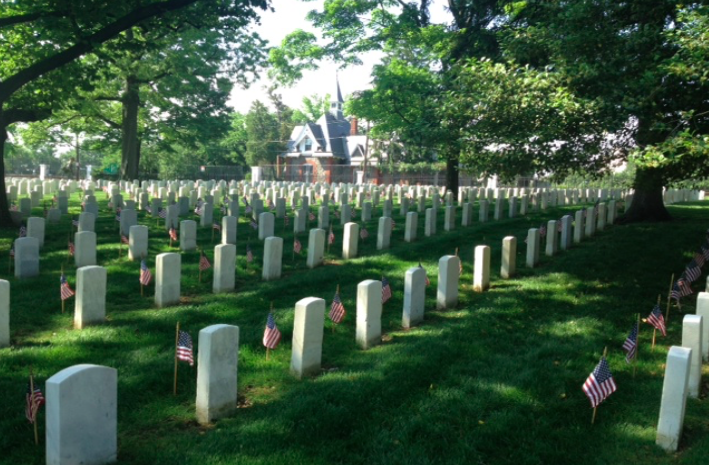BY WIN GRUENING
SENIOR CONTRIBUTOR
Memorial Day is a day of remembering the men and women who died while serving in the military. It should not be confused with Veterans Day, which celebrates the service of all U.S. military veterans or Armed Forces Day, which specifically honors those currently serving in the U.S. military.
While all these holidays are important, Memorial Day is special because it honors veterans who fought and sacrificed their lives in the service of their country.
By some accounts, the practice of decorating soldiers’ graves began around the Civil War period – hence the original name “Decoration Day.”
The preferred name for the holiday gradually changed from “Decoration Day” to “Memorial Day,” which was first used in 1882. Memorial Day did not become the holiday’s more common name until after World War II, and it was declared the official name by federal law in 1967.
It was held on May 30 for over 100 years until 1970 when it changed to the last Monday in May. It remains one of the least commercialized and most honored and revered of American holidays.
I was lucky enough to visit Washington, DC recently with friends and we took the opportunity to spend the better part of one day at Arlington National Cemetery as preparations for Memorial Day were underway.
No matter your background or political persuasion, there isn’t a way to prepare yourself for the emotional experience of viewing the graves of thousands of veterans.
Among the individual graves we visited were President John F. Kennedy and Sen. Ted Stevens – both WWII veterans. We also visited the Tomb of the Unknown Soldier, which guards the remains of unknown service members from WWI, WWII, and the Korean War.
You cannot help but get a lump in your throat when hearing Taps being played during a wreath-laying ceremony at the Tomb, which is guarded 24 hours a day – 365 days a year – by elite soldiers from the 3rd U.S. Infantry Regiment.
Arlington National Cemetery is steeped in history. Originally land belonging to the grandson of George and Martha Washington, it was later inherited by Mary Custis, who was married to Gen. Robert E. Lee. At the onset of the Civil War, the property was abandoned and the Union Army began using the land as a cemetery as war casualties mounted.
Ultimately, Congress returned the estate to the Lee family, and on March 3, 1883, the government purchased it for $150,000 (equal to $3.3 million in 2018) at a signing ceremony with Secretary of War Robert Todd Lincoln.
President Herbert Hoover conducted the first national Memorial Day ceremony in Arlington National Cemetery, on May 30, 1929. Since then, Arlington has evolved into a national shrine to all those who have honorably served our nation in times of war – as well as peace. It now is the resting place for over 400,000 active duty military members, veterans, and their families.
More than 3,000 ceremonies and memorials take place there every year along with national observances for Memorial Day and Veterans Day.
Today, Americans almost universally give tributes and praise to servicemen. The practice of spitting on soldiers – popular at the time of the Vietnam War – has disappeared.
However, while soldiers are rightly treated personally with respect, there is growing national amnesia about our past participation in military actions, and why so many brave soldiers died.
It’s become popular to paint armed conflict itself as something that our nation needs to apologize for rather than the tyranny, totalitarianism, and unspeakable atrocities that often precipitate these actions. Instead of pride in our country for protecting freedoms here and abroad, what we hear about are vague references to “mistakes” and descriptions of aggressors and defenders as morally equivalent.
Yet, America’s birth and baptism by fire in a violent revolutionary war created a tradition of liberty and bastion of freedom that remains, almost 250 years later, as a guardian of true democracy.
Memorial Day is, above all, a tribute to those who died for our country, but it should also remind us of America’s greatness and unselfish willingness to defend freedom around the world.
Win Gruening retired as the senior vice president in charge of business banking for Key Bank in 2012. He was born and raised in Juneau and graduated from the U.S. Air Force Academy in 1970 and served as a Air Force pilot for six years during the Vietnam War. He is active in community affairs as a 30-plus year member of Juneau Downtown Rotary Club and has been involved in various local and statewide organizations.

Thanks Win. This current generation quickly forgets; most do not acknowledge the sacrifices in Korea and Viet Nam. With all due respect to Suzanne and her effort s to inform, your article should get greater circulation.
My father served 22 years in the US Air Force so I spent my youth growing up on military bases. I know first hand the sacrifices that military families make. I fear that these days we have a generation that does not appreciate the sacrifices being made every day by our service members on duty around the world. It’s true that “freedom is not free”. Many thanks to Mr. Gruening for his service.
This is another well-written article, Win. Please keep them coming. Tom Senter
Comments are closed.